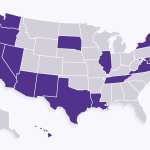State legislatures craft most of the laws passed in the United States and serve as the main pipeline for higher office. But sexual harassment in state politics “remains a systemic and ongoing issue affecting both parties” according to a new report from the nonpartisan National Women’s Defense League (NWDL), first shared with The 19th.
“Our latest research reinforces what we already knew: the problem of sexual harassment in statehouses is pervasive, damaging and covered up,” said Emma Davidson Tribbs, the NWDL’s co-founder and director. “These abuses of power that not only inflict trauma, but impede policy making, waste taxpayer resources, and disproportionately impact the leadership of women and minorities in government.”
NWDL published its inaugural report, “Abuse of Power: Uncovering a Decade of Sexual Harassment in State Government,” which tracked allegations over a 10-year period beginning in 2013, in November 2023. The updated report, released Tuesday, identified 400 allegations of sexual harassment against 145 sitting state lawmakers between 2013 and 2024. The report tracked 11 new public allegations against lawmakers in 10 states in 2024 and included four allegations inadvertently omitted from the 2023 report. The number of actual incidents is likely three times higher due to underreporting, the report said.
Public allegations of sexual misconduct against state lawmakers peaked at the height of the #MeToo movement in 2017 and 2018, leading to new protections and policy changes in some states. NWDL was founded in 2022 to track, research and develop solutions to the pervasive problem of sexual misconduct in the halls of power.
There are over 7,300 state lawmakers serving in 99 state legislative chambers throughout the United States. State legislatures are largely self-governing bodies, and even after a spate of post-#MeToo reforms, many lawmakers surveyed said the mechanisms for reporting misconduct in their states are lacking.
While the NWDL report did not track allegations against staff, sexual misconduct allegations against high-ranking staff members in the Pennsylvania governor’s office, Los Angeles mayor’s and Indianapolis mayor’s office also shed light on the issue in 2024.
-
Read Next:
As part of the updated 2024 report, NWDL commissioned a survey of state legislators, designed with perspective and input from other advocacy groups and conducted by Understory, a research and policy consulting firm. Out of the 207 lawmakers who responded, 57 percent were women, 40.6 percent were men and 2.4 percent identified another way. Roughly a third of all state lawmakers are women.
One in three state lawmakers surveyed said they experienced or witnessed sexual harassment in their state capitol, with 62 percent saying they personally experienced harassment.
The most common kinds of harassment they reported were verbal (88 percent), physical (42 percent) and unwanted sexual advances (40 percent). A little over a third, 35 percent, said they did not report the harassment. Of those who did report, 53 percent said the incident was investigated, a quarter said it was not and 22 percent said they didn’t know the outcome.
Of the incidents that were investigated, 42 percent led to consequences for the accused perpetrator, 36 percent said the accused perpetrator faced no consequences and 21 percent said they didn’t know the outcome.
About two-thirds of respondents, 64 percent, said their state had an official process for reporting sexual misconduct and 40 percent said they didn’t receive sexual harassment training and didn’t know if it was required in their state.
State Sen. Machaela Cavanaugh of Nebraska said in a statement that she “experienced various forms of harassment almost from my first day in office.”
“One particularly notable incident occurred during a live stream of a floor debate when a colleague mentioned my name while reading a scene that described a rape, demanding a sex act,” the Democrat said. “The response from leadership in the Legislature highlighted how inadequately we have addressed the issue of harassment, failing to protect staff, lobbyists, citizens, and elected officials within our government.”
State Rep. Abby Major of Pennsylvania said she’d “experienced harassment in the very halls where our laws are made.”
“In Harrisburg, it’s all too common – the governor’s top adviser, sitting lawmakers, lobbyists – and it’s all unacceptable,” the Republican said. “That’s why I’ve continued to sponsor legislation that would help prevent harassment, support survivors, and ensure that we hold everyone in the Commonwealth’s statehouse accountable.”
Across 88 bills relating to sexual harassment passed in 24 states in 2024, NWDL identified six bills in five states that focused on tackling sexual misconduct, which included state legislatures and other “political workspaces.” “This progress, while important, barely makes a dent in the work needed to address the problem of sexual harassment in legislatures,” the report said.
“Most legislatures have failed to enact laws, policies, and oversight mechanisms that establish safe workplace standards, protections for employees, and safeguards to prevent political and partisan self-interest from undermining the process,” the report found.
In some cases, political party organizations like the Nebraska Senate Republicans, Kentucky House Democrats and Indiana Senate Democrats took action to address reports of sexual misconduct in their ranks, and implemented internal rules and procedures to address sexual misconduct.
In Indiana, several Democratic officials faced public sexual misconduct allegations in 2024, prompting 40 women in Indiana politics to send a letter to the state Democratic Party demanding accountability. The accusations and surrounding outcry led to state Senate Minority Leader Greg Taylor’s ouster from leadership, the state Democratic Party instituting new ethics reforms and state Democratic Party chair Mike Schmuhl announcing he wouldn’t seek another term.
Elise Shrock, an Indiana political strategist, said in a statement she was “appalled by the ongoing pattern of sexual harassment and the lack of appetite to make the substantive, common sense changes necessary to fix it.”
“A lack of basic professionalism and respect will continue to drain our political bench,” she added. “We must fix this now.”
Sexual harassment in state capitols has a damaging effect of further marginalizing women, and especially women of color, out of political spaces, influencing whose voices are heard and what policies get passed, NWDL said. State legislatures also cultivate the bench of talent for higher offices.
The report’s release comes amid a cultural and political backlash to the #MeToo movement with some men who have been accused of sexual misconduct returning to political power.
President Donald Trump was elected to a second term in November after a jury found him liable for sexually abusing and defaming advice columnist E. Jean Carroll. He subsequently appointed several people accused of sexual misconduct to his Cabinet including former Rep. Matt Gaetz, who began his career in the Florida state legislature. Gaetz withdrew his nomination ahead of the release of a House Ethics Committee report finding substantial evidence he had sex with a minor and paid women for sex. Gaetz was never criminally charged and denied all of the allegations.
And Andrew Cuomo, a Democrat who resigned as governor of New York in 2021 after a damning investigation found he sexually harassed 11 women while in office, is attempting a political comeback with a campaign for mayor of New York City.
Cuomo, a onetime Democratic power player, resigned as governor of New York in 2021 after a five-month investigation commissioned by the New York attorney general’s office produced a damning 165-page report outlining evidence he had sexually harassed 11 women while in office. A separate investigation from the Department of Justice found Cuomo harassed 13 women who worked for the state over the course of eight years. Cuomo has denied the allegations of sexual harassment, but he has publicly apologized for overfamiliar contact and off-color jokes that made women uncomfortable.
“Addressing sexual harassment in state government could prevent serial sexual harassers — and research shows that most are repeat offenders — from causing more harm from greater positions of influence,” the report said. “In short, action at the state legislative level is an opportunity to clean up higher levels of government as well.”






